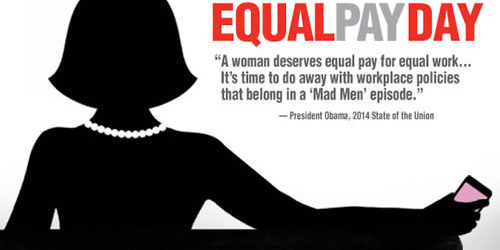Today is Equal Pay Day, symbolizing the day that a woman working full time will have made as much as a man made the year before. That’s right, it takes women 100 additional days of work to make up for the 23% pay gap that exists for equal work.
Many view equal pay for equal work as exclusively a women’s issue. But with working families increasingly relying on two incomes and more and more households headed by women, this issue is actually a family issue. At a time when women are the breadwinners of many families and make up nearly two thirds of minimum wage workers, families can’t afford this inequality and discrimination. Besides, inequality and discrimination are not now and have never been acceptable.
When a woman earns 77 cents for every dollar a man makes, all of us are affected. It affects children who rely on a single mother to provide their basic necessities. It affects small business owners whose customers have 23% less than they deserve. It affects men who rely on their spouse for either a second income or increasingly the main or only income in their household. It affects all of us because equality before the law is an American tradition that we do not take lightly.
Of course there will be pundits and conservatives wishing the issue away today. We’re sure to hear more spin saying that women don’t do the same jobs as men. However, a recent report shows that even in jobs dominated by women, men still earn more for the same work. We’ll hear conservatives argue that the pay gap doesn’t exist. But studies (like this, and this) and our own experiences tell us it does.
To be fair, the pay gap has decreased since the Equal Pay Act was signed into law fifty years ago. In the early 1960s – when “Mad Men”-style workplaces existed – women only earned 59 cents on the dollar. Today, in 2014, women earn 77 cents on the dollar. I don’t know about you but going from stunningly unfair to a little less unfair isn’t my definition of progress.
Equal pay for equal work is not an issue that should pit working men against working women. Instead, we should recognize that our economy continues to change and that ending discrimination in pay can bring us closer to giving all families the fair shot they need at success.

